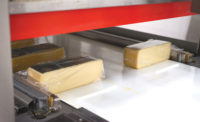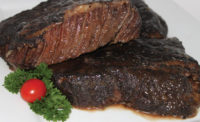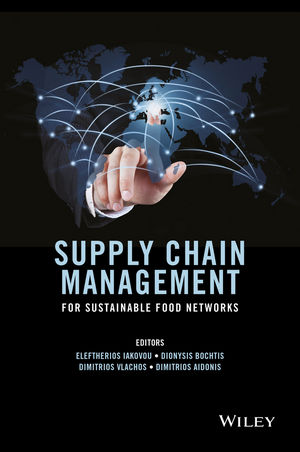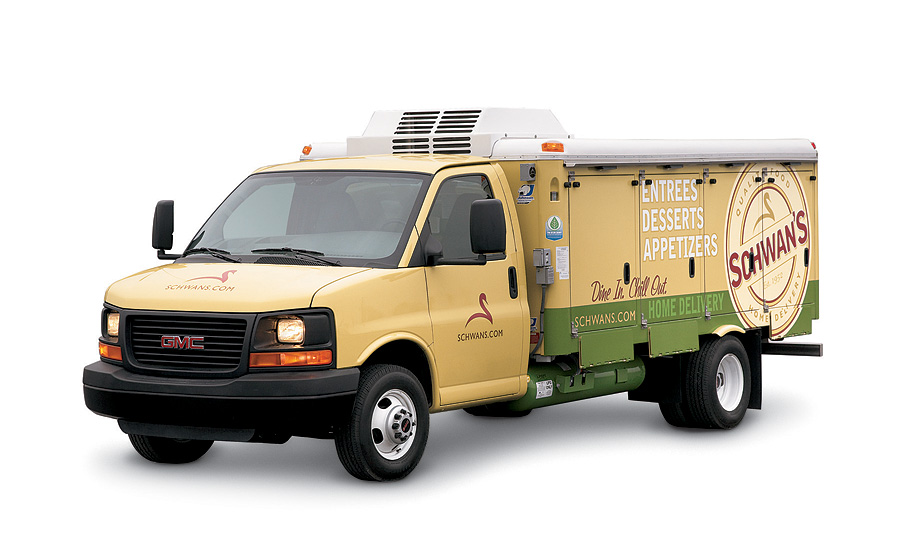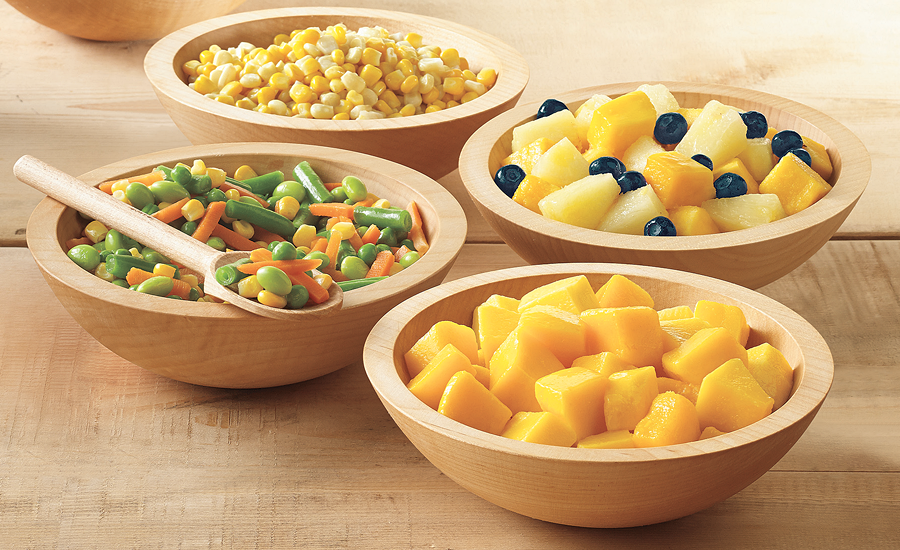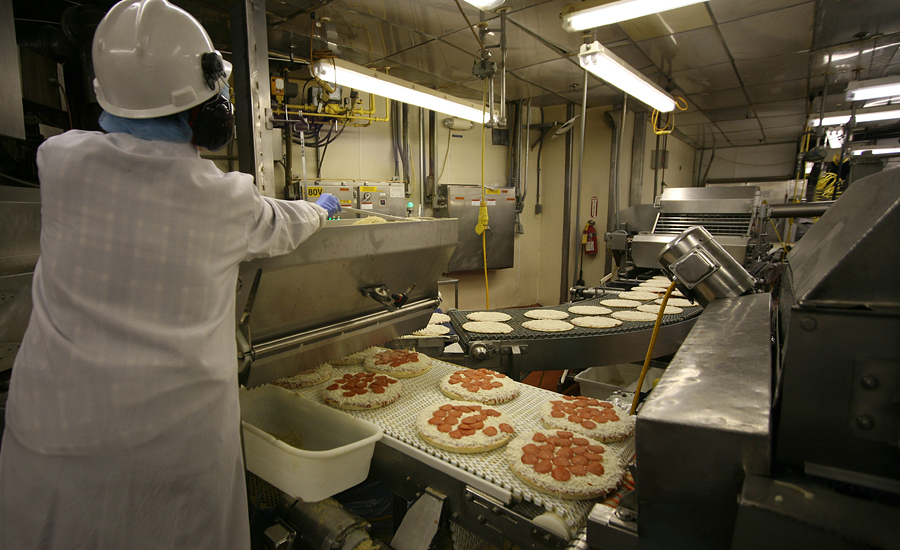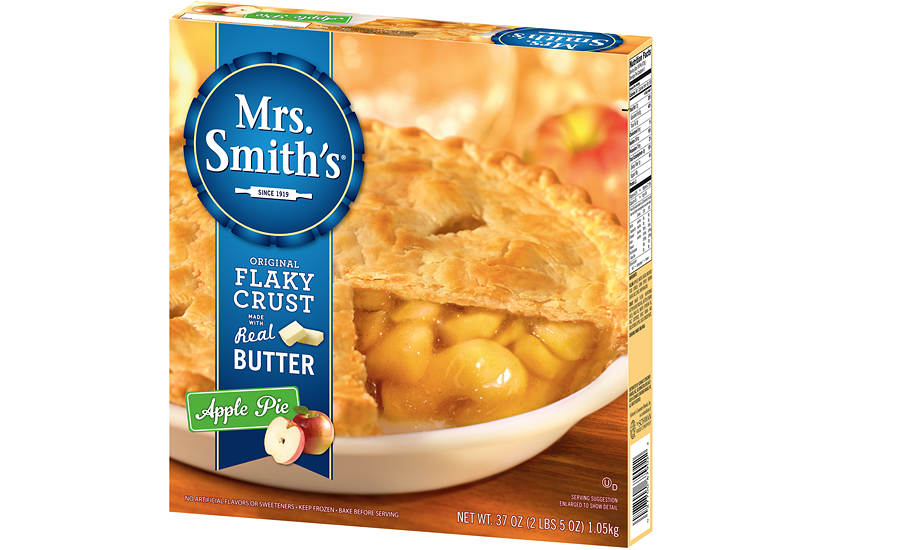How The Schwan Food Co. Exercises a ‘Greener’ Way to Do Business


















Refrigerated & Frozen Foods named The Schwan Food Co. as this year’s Sustainable Processor of the Year for its sustainable environmental efforts in home delivery fleet, direct-store-delivery systems and global supply chain and social responsibility.
The Schwan Food Co. is a powerhouse in the frozen food industry. From the kitchen table to restaurant menus to shoppers’ front door, this Marshall, Minn.-based, multi-billion dollar company can be all things to all people.
At A GlanceCompany: The Schwan Food Co. Headquarters: Marshall, Minn. Distribution: National Channels: Foodservice, retail and home delivery No. of Plants: 12 No. of Employees: 14,000 Produces: Ice cream, frozen beverages, frozen pizza, frozen desserts, frozen pies, frozen snacks, frozen appetizers. Retail Brands: Bon Appétit, Edwards, Red Baron, Freschetta, Larry’s, Mrs. Smith’s, Tony’s, Pagoda. |
But, it’s the company’s ability to exercise a “greener” way to do business that makes it the leader of the pack. Whether it’s minimizing environmental impact, reducing packaging or providing a safer, more efficient working atmosphere for employees, “we approach our sustainability efforts as a team, and we are all responsible for researching and executing our sustainability objectives within our respective disciplines,” says Bill Reilly, chief procurement officer. “For the sake of simplicity, three areas of focus for our sustainability efforts include our impact on the environment, working and living responsibly and our efforts to give back to our communities.”
The Schwan Food Co. produces ice cream, frozen beverages, frozen pizzas, frozen desserts, frozen pies, frozen snacks and frozen appetizers to restaurants, grocery stores and via home delivery under a lineup of brands, including Bon Appétit, Edwards, Red Baron, Freschetta, Schwan’s, Tony’sand LiveSmart.It employs approximately 14,000 people across 450 locations nationwide, including 12 manufacturing facilities.
And, it received Refrigerated & Frozen Foods’ Sustainable Processor of the Year award. (The Schwan Food Co. also placed in Refrigerated & Frozen Foods’ Top 150 Frozen Food Processors report, March 2015 issue—No. 8 in the meals/entrées and snacks/appetizers/sides sections and No. 4 in the dairy and bakery sectors).
“We are focused on sustainability because it makes good business sense and it is simply the right thing to do for our consumers, customers, employees and communities,” says Dimitrios Smyrnios, chief executive officer.
Find out how The Schwan Food Co. continues to expand its sustainable environmental efforts in home delivery fleet, direct-store-delivery systems and global supply chain and social responsibility.
Fleet optimization
In 2014, Schwan’s Home Service, the company’s home delivery subsidiary, celebrated 40 years of using liquefied propane gas to fuel its fleet. Schwan first implemented liquid propane systems in 1974 as a result of the oil embargoes in the 1970s. At the time, the late Marvin Schwan, founder, saw propane as a way to ensure a dependable fuel source largely produced in the United States. Over time, the company realized the environmental and economic benefits of using propane.
“One of the ways in which we are committed to sustainability is in our use of propane to fuel our trucks,” says Dave Muscato, president of Schwan’s Home Service. “Propane burns more cleanly than traditional fossil fuels, and it’s domestically abundant. Today, we believe we have among the largest propane fleets in the United States.”
Today, about 70% of the company’s fleet of 4,500 delivery trucks runs on propane, which burns more efficiently, allowing Schwan to avoid the emission of more than 25,161 tons of greenhouse gases, according to calculations provided by the National Renewable Energy Laboratory, national laboratory of the U.S. Department of Energy, Office of Energy Efficiency and Renewable Energy, operated by the Alliance for Sustainable Energy, LLC.
Plus, Schwan uses “cold-plate” technology in its home delivery refrigeration systems to keep foods frozen. Cold-plate technology uses electrical compressors to freeze cold plates overnight when energy rates are typically lower. The cold plates on the delivery trucks are cooled to -20°F and hold temperatures throughout the day.
Schwan also has programs in place to run more efficient home delivery routes, resulting in greenhouse gas reduction of more than 2,876 tons in 2014. Another program incorporates lighter trucks into the home delivery fleet. These trucks weigh about 6,000 pounds lighter and deliver a 36% improvement in fuel economy. At the end of 2014, the company’s fleet was at 40% with the lighter vehicles, a 4 percentage point improvement over the previous year. The home delivery fleet also boasts an idle shutdown set at 1 minute to reduce idling time. Going forward, Schwan plans to expand the idle-shutdown systems to 730 additional trucks in 2015, making 100% of its entire fleet equipped with idle shutdown.
Schwan’s Consumer Brands, a subsidiary that serves grocery and club stores, operates a 700-truck direct-store-delivery (DSD) system. In 2014, the business unit conducted field testing on the optimum temperature for its refrigeration systems. The work allowed for a 15°F adjustment on its DSD truck freezers, resulting in an 8% reduction in the amount of fuel used by reefer units. This also reduced costs by 22% over the previous year, as overall engine run times decreased by 250,000 hours.
Meanwhile, the company’s semi-trailers for long-haul fleet use “skirts” to help reduce wind resistance and increase fuel efficiency. Schwan’s also installed plug-in stations at its Salina, Kan., and Marshall, Minn., distribution centers.
“The stations enable us to fully use refrigerated semi-trailers that can run on electric power when parked to avoid burning diesel fuel,” says Kyle Graven, director of transportation and finance. “We have also been replacing old semi-trailers with new ones that can run off of electricity rather than diesel when parked.”
In 2014, the company added 38 new semi-trailers powered with electricity, and installed telematics systems into all refrigerated semi-trailers. The technology reports in real time the trailer location, temperatures in four zones of the semi-trailer, door openings that would cause temperature changes and fuel levels.
Plant improvement
Schwan’s Global Supply Chain, a subsidiary that focuses on procurement, manufacturing and logistics, installed sub-metering systems that enable measurement of a specific piece of equipment at each facility to empower employees to better manage energy usage and deliver efficiencies.
It also installed better refrigeration controls in plant freezer systems to help the frozen food giant achieve its 3-year goal of reducing energy usage in plants by 15%.
Likewise, Schwan’s Home Service conducted a freezer-optimization project in its 400 home delivery depots nationwide. The project led to a 5°F adjustment in home delivery depot freezers, thus reducing an estimated energy consumption of nearly 4.9 million kilowatt hours annually, without harming food quality.
Employee safety
Safety is Schwan’s first priority. In fact, its goal is to one day achieve zero employee injuries and vehicular accidents.
That’s why in 2014, Schwan achieved a more than 20% improvement in employee injuries and a near 17% improvement in the number of vehicular accidents company-wide thanks to safety leadership, setting expectations and accountabilities and encouraging broad engagement by employees at every level.
In addition, the Minnesota Safety Council recognized its dry storage warehouse and plastics plant in Marshall, Minn., with the Governor’s Safety Award, which is given to the top 10% in each industry.
And, the Walton, Ky., distribution center received Kentucky State Governor’s Safety and Health Award after accumulating nearly 500,000 working hours without a lost-time injury. Only 50 facilities in Kentucky receive this annual award.
“Safety is our top priority, and that’s stressed on a daily basis throughout The Schwan Food Co. subsidiaries,” says Randy Sharbono, vice president and assistant general counsel, who also leads the company’s safety programs. “We have an overall long-term goal to reach zero injuries, and I have no doubt that we can achieve it by working together as a team.”
Environmental efforts
In 2014, The Schwan Food Co. recycled nearly 172,495 tons of materials, including old corrugated cardboard, plastic, steel, food waste, wastewater and paper products. This effort helped divert more than 81% of the company’s materials from the nation’s landfills—a 20 percentage point improvement over 2013.
“We had a great year for our recycling programs in 2014,” says Randy Burns, senior vice president of manufacturing. “The improvement in recycling was driven by proper identification and disposition of recyclable products at our manufacturing and logistics facilities.”
Also in 2014, the Salina, Kan., pizza plant received a Gold Pre-treatment Compliance Award from the Kansas Water Environment Association for exceeding local and federal pre-treatment compliance requirements for wastewater.
This year, Schwan was named the winner of the Northwest Indiana Partners for Clean Air Award, an annual program that honors Northwest Indiana and Chicagoland businesses to promote clean air.
Schwan was also recognized as a Five-Star Ohio Green Fleet company, which identifies companies that demonstrate leadership in environmental performance and efficiency, and was named National Partner of the Department of Energy’s Clean Cities program.
Currently, Schwan is implementing a pallet optimization project designed to increase the number of cases stacked on a pallet or the number of units per pallet.
Packaging reduction
For the past six years, The Schwan Food Co. has maintained a campaign to review the packaging of its products and determine where it could be more efficient, yet still maintain the quality of its foods. Today, it requires all corrugate master cases contain a minimum of 35% recycled content and use recyclable materials when possible.
In 2014, for example, the frozen food processor reduced the amount of packaging sent to landfills by 1,475 tons. The majority of these gains were facilitated by modifying or eliminating the microwave trays for some of its Red Baronsingle-serve pizzas, as well as removing materials from corrugated master cases and optimizing its pie shell packaging.
The Schwan Food Co. also began formalizing a program that uses only fiber materials certified by the Sustainable Forest Initiative.
Social responsibility
The Schwan Food Co. has made significant progress in developing wholesome foods that meet consumers’ needs. For example, in 2014, it launched Mrs. Smith’s Original Flaky Crust fruit pies, offering a crust made with real butter, a shorter ingredients statement and no trans fats or partially hydrogenated oils.
Schwan’s Food Service, the foodservice subsidiary, also ensures that its more than 100 school foods meet or exceed USDA guidelines.
Furthermore, its website and mobile app features foods recommended for those with special dietary needs. For instance, the “Special Diets” feature on www.schwans.com helps customers identify products designed specifically for gluten-free, vegetarian, no sugar added, heart health, low sodium and low calorie.
In 2014, Schwan’s Home Service unveiled its first organic fruit and vegetable offerings, which included Daybreak Fruit Blend, Organic Mango Chunks, Organic Super Sweet Yellow and White Corn and Organic Vegetable Medley, as well as its first home-delivered gluten-free pizzas. Earlier this year, it expanded its gluten-free line to include bread, chicken nuggets, muffins and brownie bites.
“Today, consumers view health and wellness as more than just weight loss, and their expectations from food are changing at a rapid pace. Consumers desire better-for-you foods and increased transparency, and this is supporting other trends such as gluten- and sugar-free foods, high-fiber foods, high protein and much more,” says Stacey Fowler, senior vice president of product innovation and development. “I know our company is well known for some of our indulgent foods like ice cream, however, we have decades of experience developing great-tasting foodservice products that meet the stringent government standards for the national school lunch program. We also launched our Schwan’s LiveSmart brand in 2006, a line of about 80 better-for-you products in our home delivery business.”
Whether it’s minimizing environmental impact, reducing packaging or providing a safer, more efficient working atmosphere for employees, The Schwan Food Co. continues to exercise a “greener” way to do business.
Refrigerated & Frozen Foods’ editor-in-chief Marina Mayer will present the 2015 Sustainable Processor of the Year award at the 2015 Food Logistics Forum.
GO TO to nominate a company for next year's Sustainable Processor of the Year award.
Looking for a reprint of this article?
From high-res PDFs to custom plaques, order your copy today!





